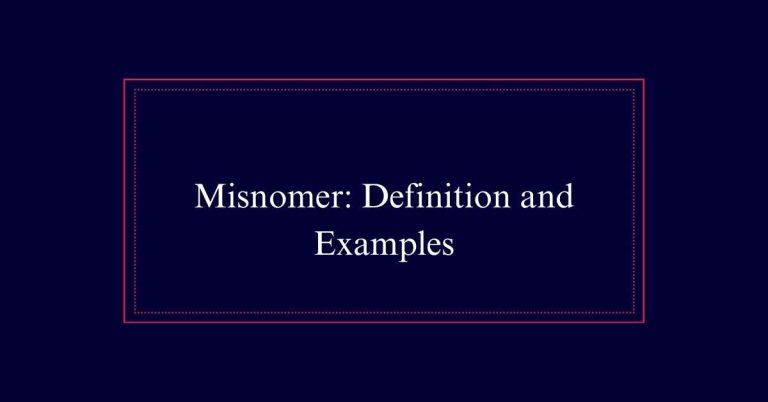Synonyms for “Because”
To enhance your writing, consider using synonyms for “because” such as “since,” “as,” “due to,” “for,” “considering,” and “as a result of.” Each of these alternatives provides a slight variation in tone and formality, making your writing more engaging and clear. For instance, “as” offers subtlety, while “due to” clearly indicates causation.
Definition of ‘Because’
‘Because’ is a conjunction used to introduce a reason or explanation for an action or situation. This word helps link phrases or clauses to provide clarity and coherence in writing. It belongs to a group of words known as conjunctions, which connect ideas within sentences.
Specifically, ‘because’ is a subordinating conjunction, meaning it links a dependent clause to an independent clause. This connection explains why something happened or why an action was taken. For example, ‘She stayed home because she was sick.’ Here, ‘because’ clarifies the reason for staying home.
Understanding how to use ‘because’ correctly enhances writing by making it more logical and easier to follow.

Role of Conjunctions
How do conjunctions function to enhance sentence structure and coherence?
Conjunctions are crucial in connecting words, phrases, and clauses. They create smooth links and logical relationships between ideas. This connection helps sentences flow better, making them easier to read and understand.
Conjunctions like ‘and,’ ‘but,’ and ‘because’ are commonly used to join related ideas.
Importance of ‘Because’
Among the various conjunctions, ‘because’ holds a unique importance in explaining reasons and causes. This word is essential in linking a dependent clause to an independent clause, providing clarity and context. It helps readers understand the rationale behind actions and events.
Without ‘because,’ sentences would lack coherence and depth. The conjunction makes writing more engaging by clearly connecting ideas and ensuring logical flow. It also aids in constructing persuasive arguments by laying out reasons explicitly.
In academic and professional writing, ‘because’ is invaluable for elaborating on the ‘why’ behind statements. Its precise use enhances the quality of communication, making complex concepts easier to grasp. Therefore, ‘because’ is indispensable in effective writing.
Using ‘As’
Using ‘as’ instead of ‘because’ can introduce variety and subtlety to your writing. ‘As’ is often used to convey causation in a more understated manner. It connects phrases smoothly and can make sentences feel more fluid.
Here are four instances where ‘as’ might be preferable:
- Formal Writing: ‘As’ can make statements sound more polished.
- Complex Sentences: It helps combine multiple ideas without overwhelming the reader.
- Narrative Flow: Using ‘as’ can maintain a natural rhythm in storytelling.
- Subtle Causation: It implies cause without being overly explicit.
As a Result of
As a result of its explicit nature, ‘as a result of’ clearly indicates causation and is particularly important for formal and technical writing. This phrase connects actions to their consequences directly. It guarantees that the reader understands why something happened.
In academic or professional documents, precision is vital. ‘As a result of’ achieves this by leaving little room for ambiguity. For example, ‘As a result of the experiment, the hypothesis was confirmed.’ This phrase is effective in reports, research papers, and business communications. It provides clarity and enhances the logical flow of information.
Employing ‘Considering’
Considering the context, ‘considering’ serves as an effective synonym for ‘because’ by highlighting the factors influencing a situation. This word adds a thoughtful tone to the explanation, making it suitable for both formal and informal writing.
Here are some key points to understand its use:
- Emphasizes Factors: It stresses the elements that contribute to the situation.
- Formal Tone: It provides a more polished and professional feel to the sentence.
- Versatile Usage: It can be used in various writing styles, from academic to casual.
- Clarity: It clarifies the reason behind a statement without altering the original meaning.
‘Due To’ Explained
‘Due to’ is a phrase often used to indicate the cause or reason behind a specific outcome or situation. It typically precedes a noun or noun phrase and explains why something happened. For example, ‘The event was canceled due to rain.’ In this sentence, ‘rain’ is the reason for the cancellation.
It is important to use ‘due to’ correctly to maintain clarity. Misuse can lead to confusion or misinterpretation. Typically, it should follow a form of the verb ‘to be’ (is, was, were).
For instance, ‘Her success is due to hard work.’ Here, ‘due to’ highlights the cause, making the sentence clear and precise.
Substituting With ‘For’
For can be a valuable alternative instead of because when explaining the reason behind an action or situation. This substitution can add variety to writing and enhance readability. Here are some key points to keep in mind when using ‘for’:
- Formal Tone: Using ‘for’ can make your writing sound more formal or literary.
- Sentence Structure: ‘For’ typically follows a comma, setting off an explanation or reason.
- Clarity: Make sure that the meaning remains clear when substituting ‘for’ in place of ‘because’.
- Context: ‘For’ is often better suited for written communication rather than spoken language.






